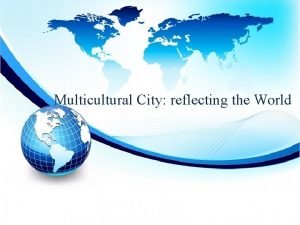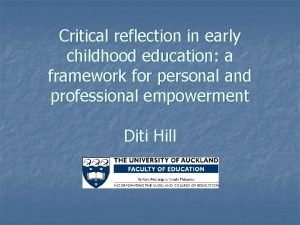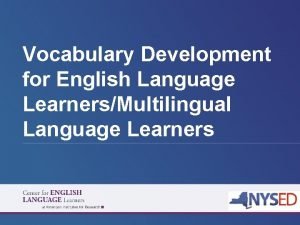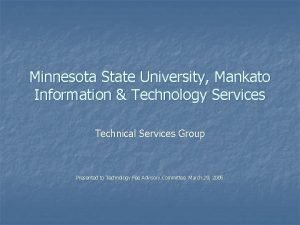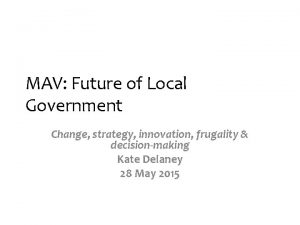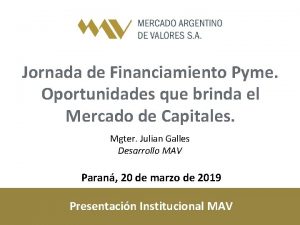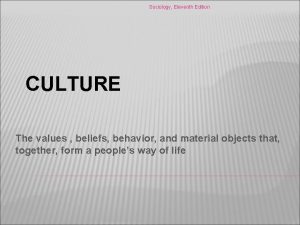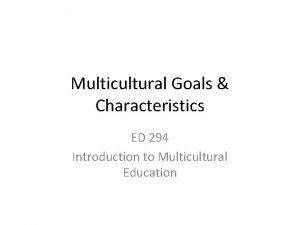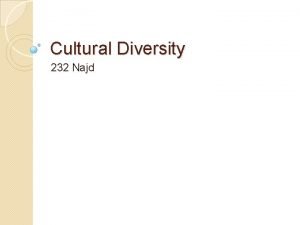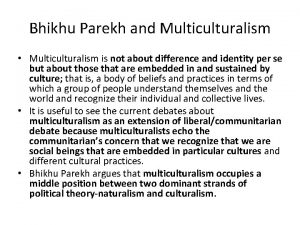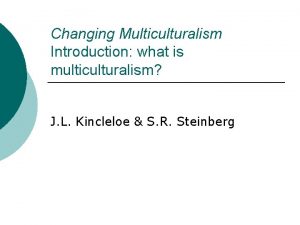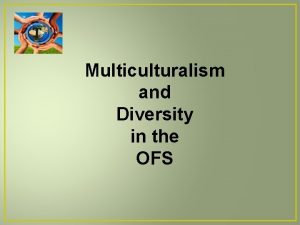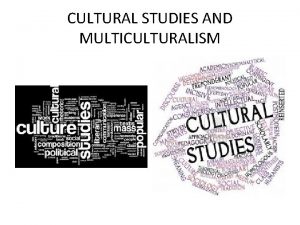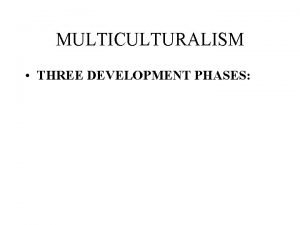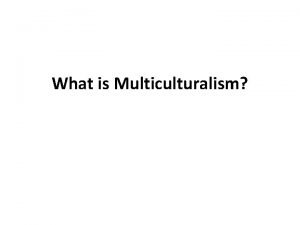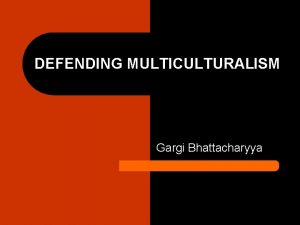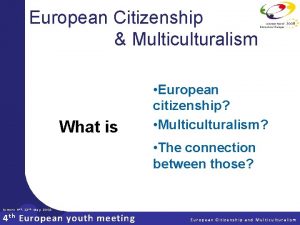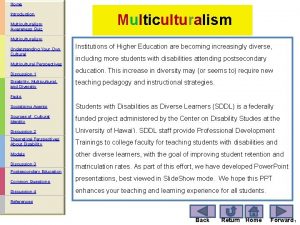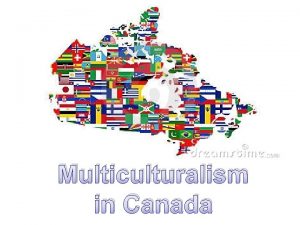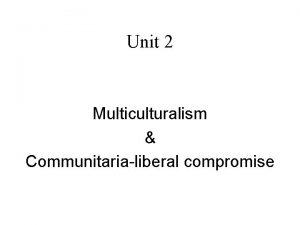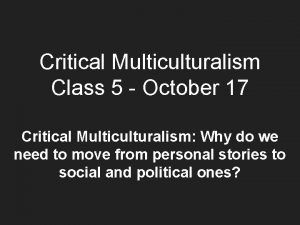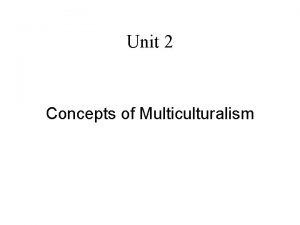Multiculturalism and Inclusive Growth MAV 2016 Paul Smyth



















- Slides: 19

Multiculturalism and Inclusive Growth MAV 2016 Paul Smyth, University of Melbourne

Todays agenda: inclusive and sustainable growth • In past ‘social’ issues as separate from economic • 1980 s90 s model (“neoliberalism”)- social spending eg multiculturalism like an ‘optional extra’ • Today we have to bring the economic and the social together • See Smyth and Buchanan Inclusive Growth in Australia (2013) ; and ALP’s Growing Together (2016) • Need a good society (include multiculturalism) to underpin a strong economy • Happening around the world: Brexit – trump‘mediscare’

After World War 2 • • social economic led policy separate lives Keynesian economics: full employment social policy: Welfare state separate lives but were thought to complement each other

From the 1980 s they were against each other • Radical Lefties critiqued welfare state as Reform (‘badiads’)not Revolution • had to get rid of capitalism as the driver of inequality

Radical Right • Radical right (neoliberalism) said welfare state ruining the economy • Hayek Friedman (leading figures) • Social welfare a cost (waste) not an investment • People on welfare as bludgers • replace public services with private markets and volunteers (a ‘big society’)

The new model • Two big ideas • From the welfare state to the social investment state • From the Washington consensus (neoliberalism) to Inclusive Growth

Social investment state (1998 -) New social risks (eg work-family – ageing) Invest in capabilities citizens to master risks ‘Stocks’ – education and skills agenda ‘Flows’ – between work family education retirement • ‘Buffers’ (eg unemployment benefits) • Taken up in Australia from National Reform Agenda to Rudd-Gillard • social inclusion agenda (the ‘ 3 rd Way’) • •

Inclusive growth (2008 -) OECD, IMF, World Bank, ADB, We. F etc ‘Pro poor’ not ‘trickle down’ Concern with inequality - Piketty, Atkinson Social inequality an economic problem Capability-freedom millenium development goals • UK PM: Theresa May’s Inequality Audit • • •

1980 s-90 s V UN Agenda 2030 • Residual social policies – a cost, safety nets V Social policies as investment. Universal policies (for all), redistribution back in the development agenda • Commercialisation of social services, cost recovery V Universal public services • targeted safety nets, pensions privatization V Social protection Floors for all and universal public social security systems, reversing pension privatization • Privatization of public assets, services/ minimalist government V Building state capacity to promote development, public investment, technology

Part 2 Inclusive Governance • INCULSIVE GROWTH NEEDS • INCLUSIVE GOVERNANCE • (see ‘Power to Persuade’ web site and materials on Social Service Futures Dialogue)

Towards inclusive governance OECD (2015) • “In the last three decades, efficiency became one of the most important guiding principles of how governments operate and how services are delivered…often putting equity or fairness considerations on the back burner”. Indeed fairness and efficiency were seen to be exclusive. • Now they are thought to go together so that “promoting inclusive growth requires strong, inclusive processes and institutions to counteract the forces that produce inequality”.

Towards inclusive governance (UNRISD 2016) • strategies for ‘social andor environmental objectives have played second fiddle to crafting pro-growth and market-centred policies’ • implementation of the 2030 Agenda for Sustainable Development presents a ‘partnerships and participation challenge’. • this is ‘an opportune moment to launch a global debate regarding the governance and politics of transformative change • imperative that mainstream … actors step out of the comfort zone of business-as-usual; question their assumptions about growth, free trade and PPPs and look into the black box of power relations that reproduce exclusionary and unsustainable patterns of development’

UNRISD how do we create a ‘rights based approach’ to governance ‘that values contestation, institutionalised dialogue, bargaining and negotiation’, one that can equip active citizens to participate effectively in what will become the ‘new social contract’ for the twenty first century

Vic leads the way? Eccles DPC Vic – response to RC on dv ‘zeitgeist change’ a national reform movement ‘citizen engagement in the public sphere’ versus the market based models of the 90 s and 2000 s. • ‘members of the public were encouraged to act as consumers. Now, increasingly, the public demands to be treated as citizens. ’ • •

From competition to co-production • Not rival businesses competing in markets policed by government stewards but • a network model in which three distinct sectors co-design and co-produce the public good. • The ‘public sector’ becomes a ‘public purpose sector comprising government, business, civil society and individual citizens’ with a shared responsibility. ’

Public service • Renew the public service: loss of institutional memory. • loss of ‘direct intelligence into what is going on at the local community level’.

The Community • Nf. Ps not competitors in pretend markets but codesignersproducers of programs who can also bring communities behind them in effecting change. • ‘These bodies’ often the best repositories of information, knowledge, understanding and experience of what specific problems need to be addressed and how. • ‘community’ more than the agencies: enablers of voluntary action • Individual citizens should have access to a commission

Different skills • an active public sector: listening engaging bringing a range of perspectives together into a cohesive outcome. • Ngos: co-design creating a shared responsibility and accountability for the performance and outcomes of the system.

And Multicultualism? • Needs to be built into the new integrated economic-social agenda • Don’t leave it as a social ‘optional extra’. Emphasise: • 1) ‘Citizenship’ : citizens of all cultures across Victoria entitled to an equal standard of social services. Demand an Equality Audit • 2) ‘Community’ : stop the marketisation of civil society. Reinvest in genuine Not for Profit organisations as partners with government in multicultural community development • 3) ‘Business’ build alliances with local business around education, training, employment to remove barriers and identify opportunites presented by a diverse community
 Multiculturalism negative effects
Multiculturalism negative effects Smyth reflection model
Smyth reflection model Word smyth.net
Word smyth.net Brief history of scouting
Brief history of scouting Baptist church founded by john smyth
Baptist church founded by john smyth Video xxx de juan herrera y mav
Video xxx de juan herrera y mav Gesa mav ekir
Gesa mav ekir Mav
Mav Mnsu mavprint
Mnsu mavprint Mav local government
Mav local government Dr vianney gilard
Dr vianney gilard Trading mav
Trading mav Mavs orgs
Mavs orgs Multiculturalism sociology
Multiculturalism sociology The definition of multiculturalism
The definition of multiculturalism Examples of multiculturalism
Examples of multiculturalism Examples of multiculturalism
Examples of multiculturalism Bhikhu parekh multiculturalism upsc
Bhikhu parekh multiculturalism upsc Mr stepek
Mr stepek Changing multiculturalism
Changing multiculturalism
